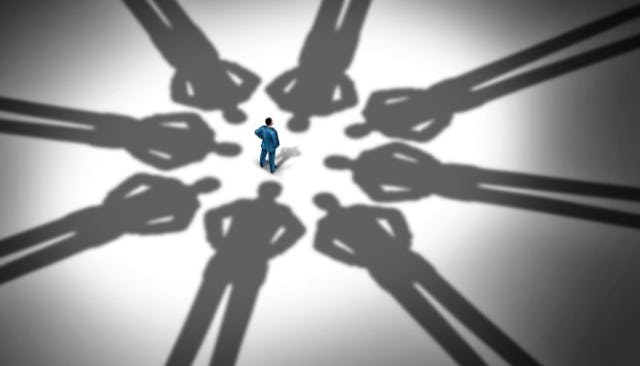What We're Really Saying When We Say A Child Needs A 'Father Figure'

“So, uh, are you worried about raising your son without a father figure?”
Every single mom raising a son without a man in the picture has gotten this question, in some variation, and most of us dread it. Plenty has been written about how this is a prying question (no mom deserves to have her personal life scrutinized) or how this is a misguided question (a child can have a father figure in another man or have multiple strong male role models). But I want to break down why the emphasis on the father figure and the male role model in relation to the sons of single mothers is so problematic in itself.
1. It reinforces a gender binary.
If gender is a spectrum, why does it matter who parents? Demanding that single mothers report who the “father” is assumes that there are only two roles possible when parenting: the father and the mother, the man and the woman. What are we saying about gender essentialism when we insist upon this framework? That just because a child is assigned “boy” at birth he needs someone who was assigned the same to raise him? As progressive parents, how can we challenge the gender binary and simultaneously insist on this myth? If we know that gender is a spectrum, then why do we allow ourselves to constantly revert to a binary understanding of who ought to be parents to a child?
2. It completely invalidates gay and lesbian parents.
As gay and lesbian adoption and parenting becomes more mainstream, it’s important to acknowledge that many families consist of two parents of the same biological sex and/or gender identity. Asking the question “Where’s the dad?” suggests that a dad must always be present in a child’s life when this is simply untrue.
By extension, the obsessive focus on the traditional family unit also means that we should be appalled and judgmental when there is no mom present. What about gay and lesbian parents? Are they not valid parents? We can’t consider ourselves champions of gay marriage and supporters of gay adoption and parenting if our language on the topic of fatherhood revolves around the notion that a man must always be present in a parental unit.
3. It puts certain parents in a box, limiting them to parenting behavior that is ‘appropriate’ for their gender.
As a single mom to a boy, I frequently hear the stereotype that boys need fathers to play rough with them. Are we insinuating that a mom can’t play rough? Personally, I’ve observed some interactions between dads and their sons playing rough that looked more like unpacking fine china wrapped in tissue paper to me.
On the contrary, my son and I play so rough that I refuse to do it with him in public or in mixed company, lest someone get the wrong idea and call CPS. I take pride in my ability to give him that physical outlet to play rough, and I find it downright insulting when someone suggests that my kid would need a man to give him that or implies that my son must be missing out on playing rough because he doesn’t have a dad.
4. It further entrenches patriarchy by making the man more powerful.
It shocks me how many heterosexual married women I hear say that their boys listen better to daddies. It stuns me how many times I’ve heard a heterosexual married woman threaten her son who is not listening with “I”ll tell Daddy!” What are we saying about who is the authority to be respected and taken seriously? We’re teaching our children that men (aka “Daddy”) are more powerful, strong, and authoritative and deserve more respect. Mommy is a pushover—in other words, that which is feminine is weak and not to be taken seriously.
The “I’ll tell Daddy” phenomenon needs to stop. Whether we are single moms or moms married to a great co-parenting man, it’s important that our boys listen to us, not just to Daddy. Furthermore, by insinuating that a child will end up on the streets because they lack a father, we are demeaning female parents and suggesting they are simply too weak and too unintelligent to seriously discipline and rear their children.
I’ll never be able to use “I’ll tell Daddy” as a threat. Why? Well, there’s the obvious reason that my son doesn’t have a daddy. But the real reason is that I know how deeply problematic this gendered language is. I know that I’m not doing my son any favors by teaching him he doesn’t have to listen unless he’s told by a man, and that he can’t grow up to be a beautiful person without a man as a role model just because he was assigned “male” at birth—because he can and he will. Single moms, carry on.
This article was originally published on